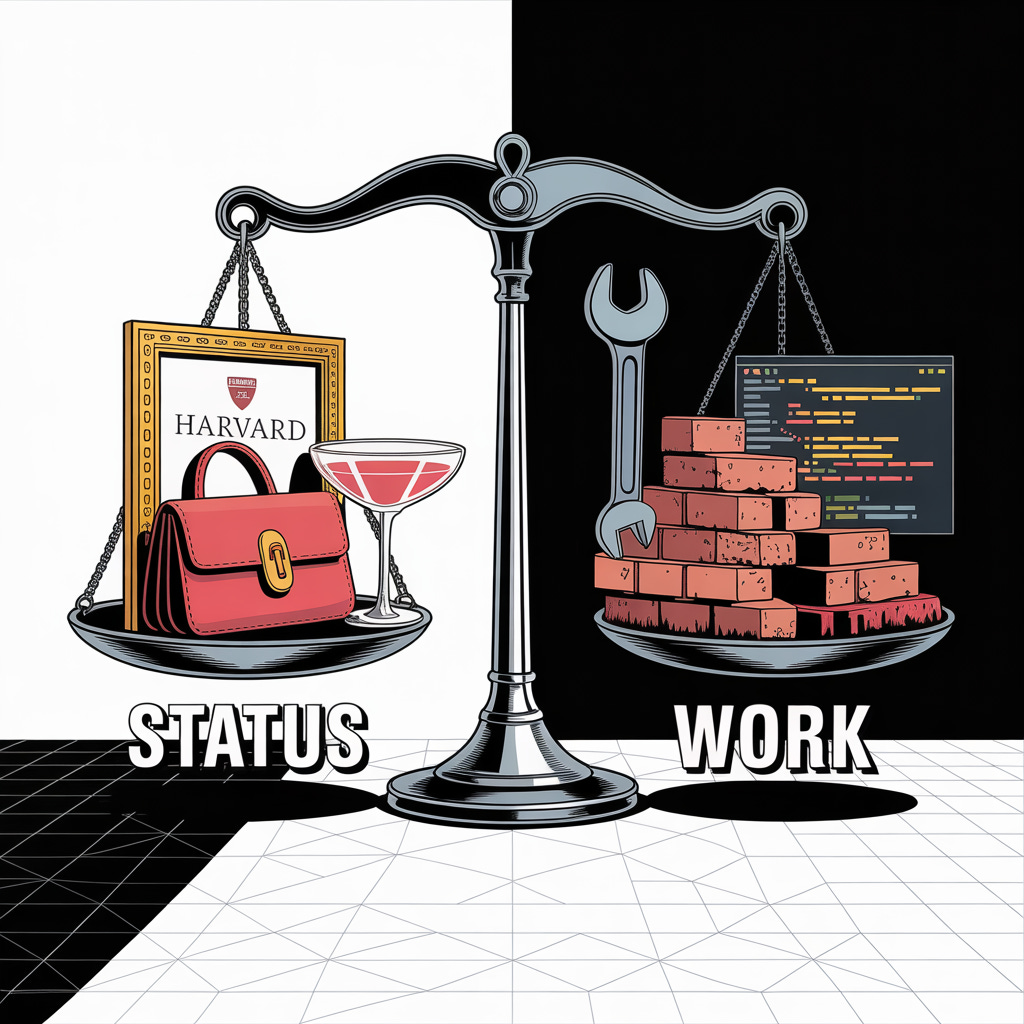The feminist script for success: compliance disguised as merit
Chasing security and consensus impedes career development
Welcome, new folks, and I’m grateful to all of you for the gift of your attention in a noisy world. After the below, I recommend catching up on parts 1 and 2 of this argument for the larger theoretical trunk, of which this argument is a branch.
I. Corporate expansion and the professional woman
One premise of the modern woman’s life is that one’s own career is a source of empowerment. Money is, indeed, freedom and power, so this assumption is understandable. But our managerially directed economy, dominated by the corporation, depends on others’ valuation of our labor capital. If one is entrepreneurial, at least labor capital is directly evaluated by the consumer. But if one is a corporate employee, the end consumer’s estimation of one’s output is secondary and almost immaterial. Women often fall into exactly this trap. I’m thinking about this because I have many friends trying to move forward after hitting a ceiling. It’s not the result of mere sexism but of choices. I’m not sure sexism is nearly the totalizing blocker it’s claimed to be.
A worker’s individual contribution is obscured by the efforts of the collective toward a product or service. Given this, a career is less a reflection of merit and more a guaranteed income based on political capital. Yet we assume that a person’s career is a reflection of their actual abilities, as many women seem to. At least in my line of work, a career reflects both competence and social capital, though the former is required for the latter. Pretense will only get you so far in a technical function. Many other sectors of the professional middle class, however, are almost entirely dependent on the worker’s social capital rather than ability.
The professional middle class and its heavy feminization come from the collision of credentialism and second-wave feminism. Middle-class women in the 60s and 70s were incensed that they were basically domestic servants and weren’t allowed to compete with men.1 In practice, they entered the workforce and created a credential moat to shield themselves from true competition by men and to smother it among themselves. This is one key reason the modern corporation seems paralyzed by endless meetings and bloat – often, women exert control over decision making by emphasizing process and consensus over action. This is another form of soft social control.
Second-wave feminism, therefore, was aligned with academia and the expansion of corporations. Academia provided the justification, and corporations absorbed the excess elites while limiting competition. The expansion of higher education and the passing of Title IX further entrenched an advantage for women to take over corporations in the following decades. Today, women are forty percent of middle management, though their lack of CEO numbers is used to obscure this fact to claim they have no power. It is the exertion of social control followed by the denial of its existence, something I’ve always reflexively fought.
II. Symbolic capital smothers outcomes
Credentials are a form of social capital; the degree itself doesn’t have an empirical value identical for every person holding one. Their value diverges according to the perceived prestige and exclusivity of the university and the area of study. Their symbolic worth is correlated with their material cost and scarcity, like a Birkin bag. This luxury good is then used as a culling mechanism to determine merit. While I do agree that degrees aren’t a function of merit like the elite seem to also tacitly realize, I’m not using that fact to undermine the idea of merit like many of them do. Merit for me but not for thee.
Unless one’s career requires the mastery of a measurable skill, the job deals in symbolism. My own job, despite being technical, also deals with symbolism. But there are two objective measures that require mastery: the system’s function and the revenue I generated. The professions not requiring specialized skills or analytical ability, focused on people and communication, are disproportionately filled by women who think degrees confer qualification and a series of corporate jobs denotes value in the market.
In a consumption economy, we surely need people to generate desire for all the unnecessary goods we produce, but the sectors women tend to inhabit create value less directly than selling or building something. I’ve been the project manager, the marketer, and the recruiter. These comms-oriented endeavors require conscientiousness, verbal agility, and relational capital, but they are highly competitive precisely because competence is difficult to measure. Thus, the people doing them can’t be evaluated but for the proxy of social capital: how well their peers think of them.
I’m speaking from having undergone performance reviews in all of these areas. It wasn’t until product management that there was something objective to measure to determine my performance. I thrived in that sort of environment, and it’s not an accident that I beat depression definitively after I exited female-dominated functions. Add such immeasurable functions to women’s covert competitive tendencies, and you have a recipe for organizational paralysis and stifled creativity. People want to have meetings about meetings, but never make a decision and take ownership.
Degree requirements are artificial barriers to employment, not unlike those of gender and race. But the PMC considers the latter illegitimate, and the former is preferred. Credentialism thereby artificially limits competition, allowing for people with resources and social capital access to the highest-paying jobs. But we also know that degrees aren’t a function of ability or competence out in the world, but of one’s conscientiousness and level of compliance in highly structured environments. At this, women excel, and it’s no small reason our college attainment is so high.
School rewards rule-following rather than creative thinking, while the professional world rewards the opposite. I learned this through experience moving through disparate industries, roles, and functions; the through line was not following whatever rules or processes existed to cut through the bullshit. Slavishly following rules and processes never built anything new, but certainly slows breakthroughs that rule breakers would otherwise reach. I see women trapped in the need to follow processes over chasing outcomes, and I’m often policed for doing so myself. Chasing outcomes requires being directive, which women read as hostile, especially from other women.
We are thereby shielded from true competition for jobs, especially those relying on social capital, where competence can’t be directly measured. For these jobs, our degrees give us a leg up on most people, something feminist popular sentiment fails to appreciate. Ironically, many women, including me, have believed that one’s career trajectory is a measure of competence, which relates to the aversion to networking that many of my friends show.
There’s a push for women to enter technical careers, but the wrong skills are emphasized in the rest of their lives, and their preferences simply don’t align with this push, in general. In fact, it’s well documented that women tend to choose areas of study and careers more suited to their preferences for people-oriented functions and communication in more gender-equal societies. That’s also what we find in the patterns of women’s choices of major and career today.
Risk aversion is a major factor in the smaller numbers in technical jobs; one has to be comfortable with being wrong, with failure, and be willing to compete openly for advancement. In practice, women tend to cluster where they have to do none of the above because it’s been sold to us as safe by other women. I said this in a group chat with women friends, and I was met with crickets, because it’s uncomfortable. Credentialism and symbolic professions reward compliance, which traps women long-term.
The dominant ideology of universities discourages men from being masculine at all and from expressing dissent from these ideas. The incentives and structure of college, along with its feminization, are thereby an exclusionary mechanism, the sort that women complain about but then enforce themselves. The feminized professional class values talking over doing. Research consistently shows that women tend to value consensus and process over outcomes, and women driven by the latter disrupt social harmony.
III. Escapting stagnation
Credentialism and feminism concentrate women in symbolic, non-productive roles while shutting men and women out who don’t have degrees, which is then framed as a moral good because men are accused of hoarding opportunity. Simultaneously, women’s dominance of the professional middle class and particularly of middle manager positions is entirely denied, as though women are still a minority in corporations. Even if working in ‘tech’, women in symbolic functions exert disproportionate control over behavior and social capital.
I was lucky to have been socially ostracized by women to be able to reach where I am; being unperturbed by their attempts at sabotage and constantly chasing new skills and functions is the source of my success in an outcomes-driven function. Burning the script was required, and I’ve been advising my friends of the same. But, they generally don’t want to listen because if I’m right, many of their life choices look ill-advised.
It’s never too late, and men can also do something here to encourage the women in their lives to orient themselves differently if they want to achieve actual security in a volatile labor market. For me, discipline, rigor, and analytical skills were the path to freedom. Female society and feminism as a psychological orientation, however, bury this difficult truth to the detriment of women’s success.
If you want to actually do something about your career stasis, start by reorienting yourself away from extractive technology, reading widely, and incorporating discipline and rigor into your life outside of work. I didn’t expect that my deep reading in areas unrelated to work would actually sharpen me professionally, especially my writing practice. I’ve developed my observation and analysis skills through writing and building theories, while I’ve also strengthened my people skills by overcoming my social anxiety and depression. Life is amazing after all these changes, though the script for life I was handed by feminism almost destroyed my sense of self-worth. We can and should do everything to build a good life outside of ideological imperatives.
See Barbara Ehrenreich’s treatment of The Feminine Mystique in Fear of Falling.










"Credentialism rewards compliance..." This is the fundamental truth of what has happened in the U.S. during my career (I retired a year ago). I watched, for instance, a move driven by Human Resources to "professionalize" certain specialties by eliminating the promotional path into management from non-degreed "technicians." When I started, you could fly a job and advertise for "a degree in such and such OR equivalent experience." HR used the argument to management that it was difficult to have an objective PROCESS to evaluate "equivalent experience" so we were told we could only advertise a job as one or the other; either require a degree or fly it as a technician position. Of course, within a year or two HR came back and argued that we needed to eliminate the "equivalent experience" option entirely because it was "inefficient" and took up too much time to screen applicants (which shouldn't have been their role anyway but that's another story). They argued requiring a degree would "professionalize" managent as well. So leadership went along with it.
When I started my career it was common to have people in management who just had a high school diploma but had worked their way up into middle management and even executive positions. By the time I retired this was non-existent, and at the same time the organization was increasingly dysfunctional and unable to meet its core mission.
Yeah, credentialism is a real problem.
Your average proggo will renounce every meaningless "privilege" but try getting them to renounce the privilege of their degree. No! -- to them, their degree is the epitome of justly earned, deserved, social power. ...To be used for good, of course. Not class self-interest.